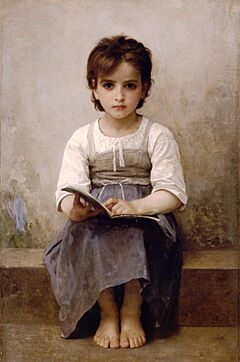Hyperlexia facts for kids

Hyperlexia is a condition where a child has an advanced and surprising ability to read at a very young age. This often happens before the age of five, and usually without anyone teaching them how to read.
This term was first used in 1967 by Norman E. Silberberg and Margaret C. Silberberg. They noticed that some children could read words far beyond their age level, but often struggled to understand the meaning of what they were reading. These children also show a strong fascination with letters and numbers from a very early age.
While they are amazing decoders of words, children with hyperlexia can sometimes have a hard time understanding spoken language. Some experts believe that most children with hyperlexia are also on the autism spectrum. It is estimated that between 5% and 20% of children with autism also have hyperlexia. However, other experts, like Dr. Darold Treffert, suggest there are different types of hyperlexia, and not all are linked to autism.
Contents
What is Hyperlexia?
Hyperlexia is best known for one main trait: a child's ability to read words is much more advanced than their ability to understand language. For example, an English-speaking child with hyperlexia might be able to spell a long word like elephant before they turn two or read full sentences before they are three.
Key Characteristics
Children with hyperlexia often share several common traits:
- Advanced Reading Skills: They can read words and sentences at a level far above what is expected for their age.
- Fascination with Written Material: They show an intense interest in letters, numbers, and written words. They might enjoy looking at books, signs, or even license plates.
- Challenges with Understanding: Even though they can read the words, they may not understand the story or the information in the text.
- Difficulty with Spoken Language: They might struggle to understand conversations or answer questions like "Who?", "What?", "Where?", "Why?", and "How?".
- Echolalia: They may repeat words or phrases they hear from others or from TV shows. This is called echolalia.
- Social Difficulties: They often have less interest in playing with other children and may find social situations challenging.
How Language and Social Skills Develop
Children with hyperlexia learn and develop in a different way than their peers. Their milestones, or key stages of development, might happen in a different order.
For instance, their ability to read appears very early, but their spoken language can be delayed. They might learn to talk by memorizing and repeating words and sentences, a process called rote memorization. This can make it hard for them to have a natural, back-and-forth conversation.
Spontaneous language, which is when you think of words and form sentences on your own, can be difficult for them. However, many children with hyperlexia make great progress in their communication skills between the ages of four and five. Their social skills often take more time to develop, as they may prefer activities they can do alone.
Are There Different Types of Hyperlexia?
Dr. Darold Treffert, an expert on the topic, suggested that there are three main types of hyperlexia. This helps to understand that not everyone with this ability is the same.
- Type 1: These are bright, neurotypical children (children without a developmental disorder) who simply learn to read very early. They do not have other learning or social challenges.
- Type 2: This type includes children who are on the autism spectrum. For them, the ability to read early is a special skill, sometimes called a "splinter skill."
- Type 3: These children also read early and may show some behaviors similar to autism, but they are not autistic. These behaviors tend to decrease and fade away as the child gets older.
Where Does the Word Come From?
The word hyperlexia is made from two words from the Greek.
- hyper means 'over', 'beyond', or 'above measure'.
- lexis means 'word'.
So, "hyperlexia" literally means "over-word" or "above-average with words," which perfectly describes this unique ability.
 | Valerie Thomas |
 | Frederick McKinley Jones |
 | George Edward Alcorn Jr. |
 | Thomas Mensah |

